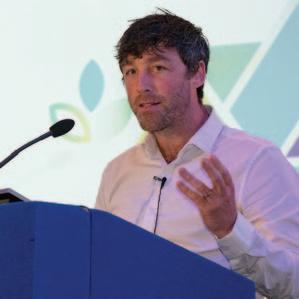
6 minute read
A chance for changen
A CHANCE FOR CHANGE
OVER 300 MEMBERS LOGGED IN FOR THE SCSI’S FIRST-EVER VIRTUAL NATIONAL CONFERENCE ON DECEMBER 2.
The SCSI held a hugely successful virtual conference on December 2, with over 300 surveyors from all over the country logging in for presentations, panel discussions and break-out sessions from a truly impressive line-up of speakers. The Hopin online events platform enabled attendees to move seamlessly from the main stage to break-out sessions, networking opportunities and exhibition areas, while the chat function facilitated comments and questions throughout the morning. The event was supported by main sponsor Eugene F. Collins, along with The Irish Times, Offr, Murphy Geospatial, SAP Landscapes, and Autodesk.
Welcome Society CEO Shirley Coulter welcomed delegates to the Conference and spoke of the resilience and willingness to adapt demonstrated by the profession in these last months. She said that staff and volunteers at the Society had worked tirelessly to assist members, producing reports and supports to enable a safe return to work. She reiterated that the SCSI is in a unique position to provide expert advice to Government, both on the changes required by Covid-19, and on tackling the ongoing issues that we face, such as the housing crisis.
FEATURE
Ann-Marie Hardiman Managing Editor, Think Media Society President Micheál Mahon said that this first virtual conference was indicative of the huge changes that had taken place, and that this period was also a catalyst for further much-needed change in the industry. He said that the topics covered in the conference were areas in which the Society is hugely active, such as housing, technology, and the environment. He asked members to reach out and get involved in their Society, whether to join a committee or to contribute their expertise to these ongoing discussions.

Housing The first topic on the main stage was ‘Housing’, and the eminent panel, chaired by Rowena Quinn of Hunters Estate Agents, included Dr Rory Hearne, Assistant Professor in Social Policy at Maynooth University, John Moran, CEO and founder of RHH International and Interim Chair of the Land Development Agency, Claire Solon, Managing Director of Greystar Ireland, and Paul Mitchell, Director at Mitchel McDermott. Rory Hearne drew on 20 years’ experience in housing research in a presentation on the roots of Ireland’s housing crisis, and how to solve it. He said that Covid-19 had highlighted the importance of quality of housing for all sectors of society. He advocated for a massive State building programme to provide up to 400,000 social and affordable homes over the coming decades, and spoke about the benefits of the cost rental model as part of that solution. The discussion that followed showed the complexity of this issue, which will require radical approaches across a range of areas. Topics included the need for better standards in private rented accommodation, and the challenges of funding such a massive building programme and the infrastructure required alongside it. Environmental and sustainability issues were also discussed, especially in relation to urban and rural regeneration, in particular renovations of living space ‘over the shop’, and the regulatory challenges inherent in these. The issue of achieving real social integration in social and affordable housing, as is the case in many European models, was also discussed.





Modern construction methods This session, chaired by Society President Micheál Mahon, featured an international panel of speakers and much food for thought. Mark Farmer, author of the Farmer Review, an influential 2016 independent government review of the UK’s construction labour model, spoke about how adoption of modern construction methods is essential to rebuild the resilience of the sector, which has been eroded by skills shortages, recessions, and lack of public trust. He said that change is no longer theoretical; it is happening across the industry, but needs leadership. Amy Marks, Head of Industrialised Construction Strategy and Evangelism at Autodesk, gave the US and international perspective. She talked about how modern construction methods means far more than just prefabrication, and how data and how we use it will be crucial to success, particularly as large international firms seek consistency in design and build across national boundaries. PJ Rudden, Chair of the Construction Sector Group’s Innovation Committee, gave the Irish perspective and described the enormous amount of work being done here to re-invent the sector and build a new industry in Ireland. The Q&A session that followed discussed how Ireland, with its large numbers of small and medium-sized firms, can meet these challenges. The message from the panel was that Ireland can be at the centre of change because of our ability to integrate new technology into our culture, and that the key to success is use of data and design across multiple projects, if firms can bring clients on the journey with them to embrace standardisation and collaboration.

Driving performance, livability and sustainability The final session on the main stage was chaired by Lily Ellis of JLL and was an extremely timely discussion of how we can make buildings better for a post-Covid world. Catriona Brady, Head of Better Places for People and Strategic Planning Lead at the World Green Building Council, introduced the Council’s Health and Well-Being Framework, which was launched recently and which sets out aims and guidelines to make buildings better, not just for the people who live and work in them, but for all those involved in the building’s life cycle. Michela Hancock, Managing Director of Greystar Europe, offered fascinating case studies of two build-to-rent developments in the UK, and discussed how Greystar’s placemaking principles create and nurture communities, including how this has had to change in the wake of the Covid19 pandemic, when communal spaces could not be used and in-person events were no longer possible. Prof. John Macomber of Harvard Business School presented research into healthy buildings, and how evidence of the health and social benefits is now being matched by a convincing business case for developers, investors and occupiers. The panel discussion highlighted the fact that the landscape post Covid has changed irrevocably; public health is now permanently on the agenda, and professional organisations such as the SCSI have a vital role in showing that the industry is ready for change, and ready to show leadership in normalising these approaches.


Message from the Minister The Conference featured a video message from Minister for Housing, Local Government and Heritage Darragh O’Brien TD. The Minister thanked the industry for its role in delivering housing and infrastructure in the safest possible manner during the past months. He spoke of the Government’s ambitious plans to provide high-quality, sustainable, affordable housing in the coming years, and said that this would not be possible without partnership with the industry.
Break-out sessions Delegates at the conference could also attend a large number of concurrent break-out sessions throughout the morning, which covered topics such as: planning and adapting to change; research within practice; rapid change in property; family business workshop; information lifecycle; green leases; and procurement and contracts.
All of the conference sessions are available online at www.dropbox.com/sh/pc33kvm61l73dgq/ AABhkyG1RWIegC7XdEZnsDMya/Videos?dl=0&subfolder _nav_tracking=1.

SUCCESSFUL CONFERENCE Clockwise from top: Amy Marks, Autodesk; Mark Farmer, Cast; and Dr Rory Hearne, Maynooth University.











